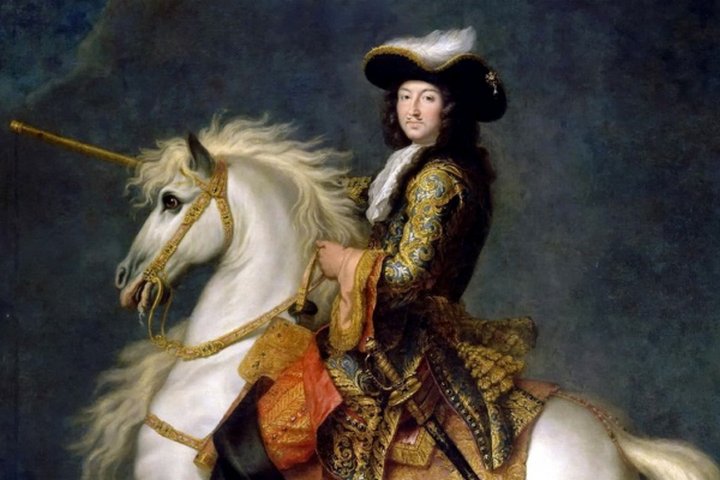1. The most brilliant of the kings of France was also the most "long-playing" monarch of Europe. He ruled for 72 years, and even the current Queen of England, Elizabeth, who ascended the throne in 1952, has not yet managed to “get around” the radiant Sun King.
2. Louis XIV believed that he was a kind of gift from God.
3. For more than twenty years, Queen Anne of Austria could not get pregnant from Louis XIII, when, finally, by incredible chance, this happened, Louis XIII, in joy, decided to dedicate the whole country to the Blessed Virgin and give himself and the kingdom under her heavenly protection.
4. The royal couple was lucky - on September 5, 1638, a boy was born. Moreover, the little dauphin was born on the most suitable day for this, on Sunday, the day of the sun. They also say that the divine manifestation of heavenly grace was the fact that Louis XIV was born immediately with two teeth in his mouth. Therefore, he immediately received the nickname Louis-Dieudonné, that is, "given by God."
5. The famous philosopher Tommaso Campanella, who lived in those years at the French court, wrote the once popular treatise “The City of the Sun”, connected his utopian city with the appearance of the heir of France on the day of the Sun, and confidently declared: “Like the sun, he will please with his warmth and light France and her friends.

King Louis 13
6. In 1643, Louis XIV ascended the throne as a four-year-old boy and began to build his future and the future of the country. As the era of the Sun King, people remember the reign of Louis XIV. And this is all thanks to the huge benefits received after the end of the 30-year war, the rich resources of the country, military victories and many more factors.
7. His father, Louis XIII, died on May 14, 1643 at the age of 41, when little Louis was 4 years and 8 months old. The throne automatically passed to him, but, of course, it was impossible to rule the state at such a tender age, so his mother, Anna of Austria, became regent. But in fact, Cardinal Mazarin managed the affairs of the state, who was not only the godfather of the king, but, in fact, for some time became his real stepfather and did not have a soul in him.
8. Louis XIV was officially crowned at the age of 15, but in fact, he did not rule the state for another seven years - until the death of Mazarin. By the way, then this story repeated itself with his great-grandson Louis XV, who ascended the throne at the age of 5, after the death of his brilliant grandfather.
9. 72 years of the reign of King Louis XIV received the name "Great Century" in French history.
10. When Louis was 10 years old, a virtual civil war broke out in the country, in which the opposition Fronde opposed the authorities. The young king had to endure a blockade in the Louvre, a secret flight, and many other things that were by no means royal.

Anna of Austria - mother of Louis 14
11. Louis XIV grew up, along with him the firm intention to rule the country independently grew, because in the period from 1648 to 1653 civil wars flared in France, and at that time the young monarch found himself in the wrong hands as a puppet. But he successfully defeated the rebellions and in 1661 took all power into his own hands after the death of the first minister Mazarin.
12. It was during these years that his character and his views were formed. Remembering the turmoil of childhood, Louis XIV was convinced that the country could flourish only with the strong, unrestricted power of the autocrat.
13. After the death of Cardinal Mazarin in 1661, the young king convened a Council of State, at which he announced that from now on he intended to rule independently, without appointing a first minister. Then he decided to build a large residence in Versailles, so as not to return to the unreliable Louvre.
14. In 1661, the 23-year-old King Louis XIV of France arrived at his father's small hunting castle, located near Paris. The monarch ordered the large-scale construction of his new residence to begin here, which was to become his stronghold and refuge. The dream of the Sun King came true. In Versailles, created at his request, Louis spent his best years, and here he ended his earthly journey.
15. In the period from 1661 to 1673, the monarch carried out the most productive reforms for France. Louis XIV carried out reforms in the social and economic spheres to reorganize all state institutions. Literature and art flourished in the country.

Versailles
16. The royal court moves to the Palace of Versailles, it is considered a monument of the era of Louis XIV. The monarch there surrounds himself with noble nobles and keeps them constantly under control, thus he excluded any possibility of political intrigues.
17. This king, as they say, worked great with frames. The actual head of government for two decades was Jean-Baptiste Colbert, a talented financier. Thanks to Colbert, the first period of the reign of Louis XIV was very successful from an economic point of view.
18. Louis XIV patronized science and art, because he considered it impossible for the prosperity of his kingdom without a high level of development of these areas of human activity.
19. If the king would only be engaged in the construction of Versailles, the rise of the economy and the development of the arts, then, probably, the respect and love of subjects for the Sun King would be limitless.
20. However, the ambitions of Louis XIV extended much beyond the borders of his state. By the early 1680s, Louis XIV had the most powerful army in Europe, which only whetted his appetites.

21. In 1681, he established the chambers of reunification to seek the rights of the French crown to certain areas, seizing more and more new lands in Europe and Africa.
22. Louis XIV became an absolute monarch and first of all put things in order in the treasury, created a strong fleet, and developed trade. By force of arms, he realizes territorial claims. So, as a result of hostilities, Franche-Comté, Metz, Strasbourg, a number of cities in the Southern Netherlands and some other cities retreat to France.
23. The military prestige of France rose high, which allowed Louis XIV to dictate his terms to almost all European courts. But this circumstance turned against Louis XIV himself, the enemies of France rallied, and the Protestants turned against Louis for the persecution of the Huguenots.
24. In 1688, the claims of Louis XIV to the Palatinate led to the fact that all of Europe took up arms against him. The so-called War of the League of Augsburg dragged on for nine years and led to the parties maintaining the status quo. But the huge expenses and losses incurred by France led to a new economic decline in the country and the depletion of funds.
25. But already in 1701, France was embroiled in a long conflict, called the War of the Spanish Succession. Louis XIV expected to defend the rights to the Spanish throne for his grandson, who was to become the head of two states. However, the war, which engulfed not only Europe, but also North America, ended unsuccessfully for France. According to the peace concluded in 1713 and 1714, the grandson of Louis XIV retained the Spanish crown, but its Italian and Dutch possessions were lost, and England, by destroying the Franco-Spanish fleets and conquering a number of colonies, laid the foundation for its maritime dominion. In addition, the project of uniting France and Spain under the hand of the French monarch had to be abandoned.

King Louis 15
26. This last military campaign of Louis XIV returned him to where he started - the country was mired in debt and groaning from the burden of taxes, and here and there rebellions broke out, the suppression of which required more and more resources.
27. The need to replenish the budget led to non-trivial solutions. Under Louis XIV, trade in public offices was put on stream, reaching its maximum scope in the last years of his life. To replenish the treasury, more and more new positions were created, which, of course, brought chaos and discord into the activities of state institutions.
28. The ranks of opponents of Louis XIV were joined by French Protestants, after the “Edict of Fontainebleau” was signed in 1685, repealing the Edict of Nantes by Henry IV, which guaranteed the Huguenots freedom of religion.
29. After that, more than 200,000 French Protestants emigrated from the country, despite severe penalties for emigration. The exodus of tens of thousands of economically active citizens dealt another painful blow to the power of France.
30. At all times and eras, the personal life of monarchs influenced politics. Louis XIV in this sense is no exception. Once the monarch remarked: "It would be easier for me to reconcile the whole of Europe than a few women."

Maria Theresa
31. His official wife in 1660 was a contemporary, the Spanish Infanta Maria Theresa, who was Louis' cousin both by father and mother.
32. The problem of this marriage, however, was not in the close family ties of the spouses. Louis simply did not like Maria Theresa, but dutifully agreed to a marriage that was of great political importance. The wife bore the king six children, but five of them died in childhood. Only the first-born survived, named, like his father, Louis and went down in history under the name of the Great Dauphin.
33. For the sake of marriage, Louis broke off relations with the woman he really loved - the niece of Cardinal Mazarin. Perhaps parting with his beloved also influenced the attitude of the king towards his lawful wife. Maria Theresa resigned herself to her fate. Unlike other French queens, she did not intrigue and did not get into politics, playing a prescribed role. When the queen died in 1683, Louis said: "This is the only worry in life that she has caused me."

Louise - Francoise de Lavaliere
34. The king compensated for the lack of feelings in marriage by relations with favorites. Louise-Francoise de La Baume Le Blanc, Duchess de La Vallière, became Louise-Francoise de La Baume Le Blanc, for nine years. Louise was not distinguished by dazzling beauty, besides, due to an unsuccessful fall from a horse, she remained lame for life. But the meekness, friendliness and sharp mind of Limps attracted the attention of the king.
35. Louise bore Louis four children, two of whom survived to adulthood. The king treated Louise quite cruelly. Becoming cool to her, he settled the rejected mistress next to the new favorite - the Marquise Francoise Athenais de Montespan. The heroine de Lavaliere was forced to endure the bullying of her rival. She endured everything with her usual meekness, and in 1675 she took the veil as a nun and lived for many years in a monastery, where she was called Louise the Merciful.

Françoise Athenais Montespan
36. In the mistress before Montespan there was not even a shadow of the meekness of her predecessor. A representative of one of the most ancient noble families of France, Francoise not only became an official favorite, but for 10 years she turned into a “true queen of France”.
37. Francoise loved luxury and did not like to count money. It was the Marquise de Montespan who turned the reign of Louis XIV from deliberate budgeting to unbridled and unlimited spending. Capricious, envious, imperious and ambitious Francoise knew how to subordinate the king to her will. New apartments were built for her in Versailles, she managed to arrange all her close relatives for significant government posts.
38. Francoise de Montespan bore Louis seven children, four of whom survived to adulthood. But the relationship between Françoise and the king was not as faithful as with Louise. Louis allowed himself hobbies in addition to the official favorite, which angered Madame de Montespan. To keep the king to herself, she became involved in black magic and even got involved in a high-profile case of poisoning. The king did not punish her with death, but deprived her of the status of a favorite, which was much more terrible for her. Like her predecessor, Louise le Lavaliere, the Marquise de Montespan changed her royal quarters to a convent.
39. The new favorite of Louis was the Marquise de Maintenon, the widow of the poet Scarron, who was the governess of the king's children from Madame de Montespan. This favorite of the king was called the same as her predecessor, Francoise, but the women differed from each other, like heaven and earth. The king had long conversations with the Marquise de Maintenon about the meaning of life, about religion, about responsibility before God. The royal court changed its luster to chastity and high morality.
40. After the death of his official wife, Louis XIV was married in secret to the Marquise de Maintenon. Now the king was occupied not with balls and festivities, but with masses and reading the Bible. The only entertainment he allowed himself was hunting.

Marquise de Maintenon
41. The Marquise de Maintenon founded and directed the first secular school for women in Europe, called the Royal House of Saint Louis. The school in Saint-Cyr has become an example for many such institutions, including the Smolny Institute in St. Petersburg. For her strict disposition and intolerance for secular entertainment, the Marquise de Maintenon was nicknamed the Black Queen. She survived Louis and after his death retired to Saint-Cyr, living the rest of her days in the circle of pupils of her school.
42. Louis XIV recognized his illegitimate children from both Louise de La Vallière and Francoise de Montespan. All of them received their father's surname - de Bourbon, and dad tried to arrange their lives.
43. Ludovic, the son of Louise, was promoted to French admiral at the age of two, and having matured, went on a military campaign with his father. There, at the age of 16, the young man died.
44. Louis-Auguste, the son of Francoise, received the title of Duke of Maine, became a French commander and, in this capacity, accepted Abram Petrovich Hannibal, godson of Peter I and great-grandfather of Alexander Pushkin, for military training.
45. Francoise-Marie, the youngest daughter of Louis, was married to Philip of Orleans, becoming the Duchess of Orleans. Possessing the character of a mother, Françoise-Marie plunged headlong into political intrigues. Her husband became the French regent under the infant king Louis XV, and the children of Francoise-Marie married the offspring of other royal dynasties in Europe. In a word, not many illegitimate children of ruling persons got such a fate, which fell to the lot of the sons and daughters of Louis XIV.

46. The last years of the king's life turned out to be a difficult test for him. The man who all his life defended the choice of God of the monarch and his right to autocratic rule, experienced not only the crisis of his state. His close people left one by one, and it turned out that there was simply no one to transfer power to.
On April 13, 1711, his son, the Grand Dauphin Louis, died. In February 1712, the eldest son of the Dauphin, the Duke of Burgundy, died, and on March 8 of the same year, the eldest son of the latter, the young Duke of Brittany. March 4, 1714 fell from a horse and a few days later died the younger brother of the Duke of Burgundy, the Duke of Berry. The only heir was the 4-year-old great-grandson of the king, the youngest son of the Duke of Burgundy. If this baby had died, the throne after the death of Louis would have remained vacant. This forced the king to add even his illegitimate sons to the list of heirs, which promised internal strife in France in the future.
48. When the French, along with their British competitors, were mastering the newly discovered America with might and main, Rene-Robert Cavelier de la Salle staked out land on the Mississippi River in 1682, naming them Louisiana, precisely in honor of Louis XIV. True, then France sold them.

49. Louis XIV built the most majestic palace in Europe. Versailles was born from a small hunting estate and became a real royal palace, causing the envy of many monarchs. Versailles had 2,300 rooms, 189,000 square meters, a park on 800 hectares of land, 200,000 trees and 50 fountains.
50. At the age of 76, Louis remained active, active and, as in his youth, regularly went hunting. During one of these trips, the king fell and injured his leg. Doctors found that the injury had provoked gangrene and suggested amputation. The Sun King refused: it is unacceptable for royal dignity. The disease progressed rapidly, and soon the agony began, stretching for several days. At the moment of clearing his mind, Louis looked around those present and uttered his last aphorism: - Why are you crying? Did you think that I would live forever? On September 1, 1715, at about 8 o'clock in the morning, Louis XIV died in his palace in Versailles, four days before his 77th birthday. France said goodbye to the great monarch. There was a growing threat from the growing strength of Britain.








